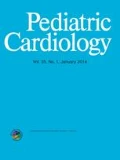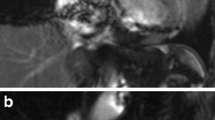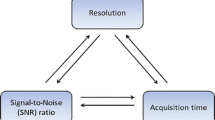Abstract.
Magnetic resonance imaging (MRI) is a unique and insightful tool for the assessment of physiology and function in congenital heart disease, in both the preoperative and postoperative state. MRI can accurately measure the volume and mass of unusual ventricular shapes, perform myocardial tissue and blood tagging, and can measure velocity and flow using phase-encoded velocity mapping. This has added new dimensions to research in pediatric cardiology. Newer techniques such as oxygen-sensitive MRI and echo-planar MRI promise further advances in the field. This article describes contemporary MRI studies of the physiology of complex congenital heart disease.
Similar content being viewed by others
Author information
Authors and Affiliations
Rights and permissions
About this article
Cite this article
Fogel, M. Assessment of Cardiac Function by Magnetic Resonance Imaging. Pediatr Cardiol 21, 59–69 (2000). https://doi.org/10.1007/s002469910008
Published:
Issue Date:
DOI: https://doi.org/10.1007/s002469910008




